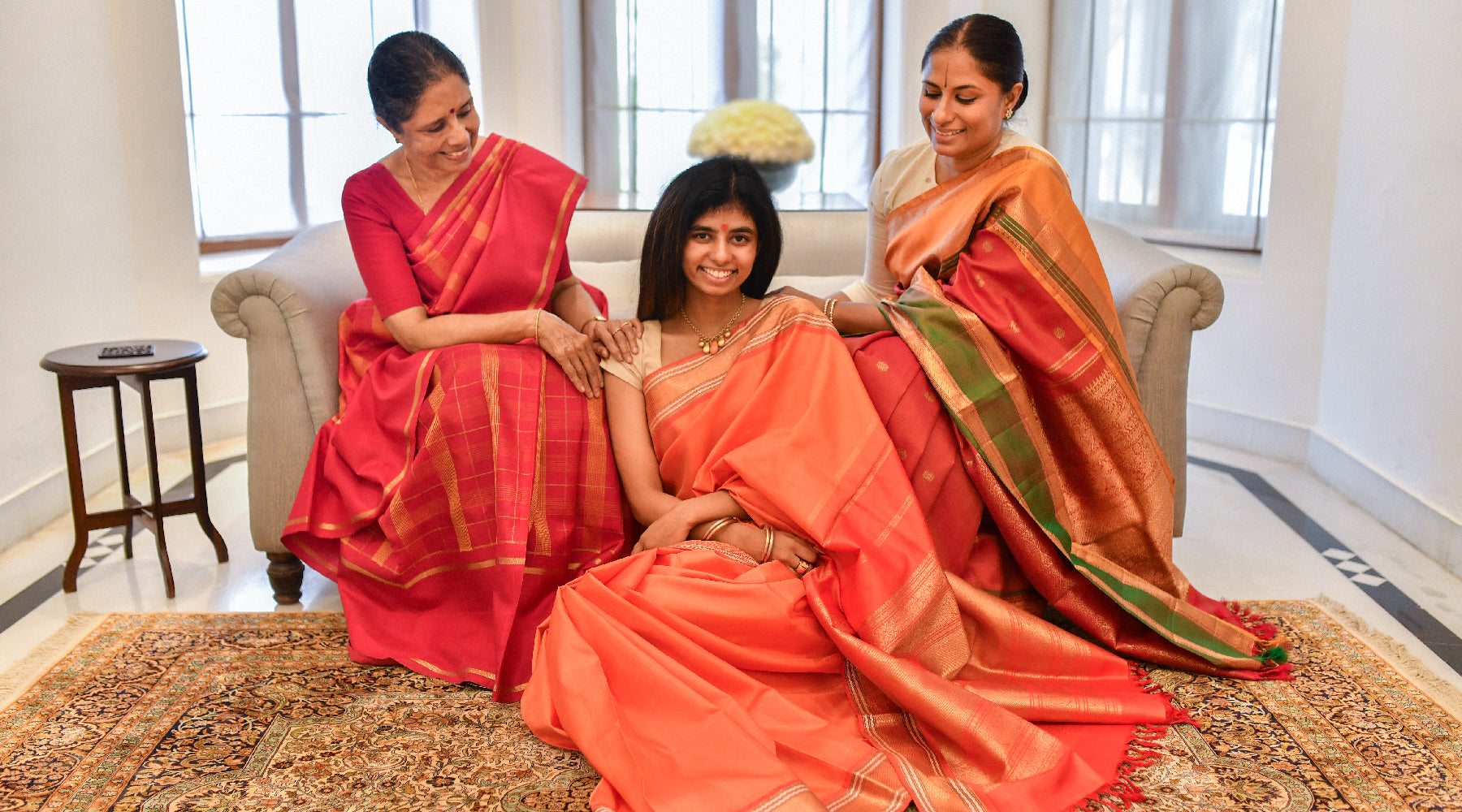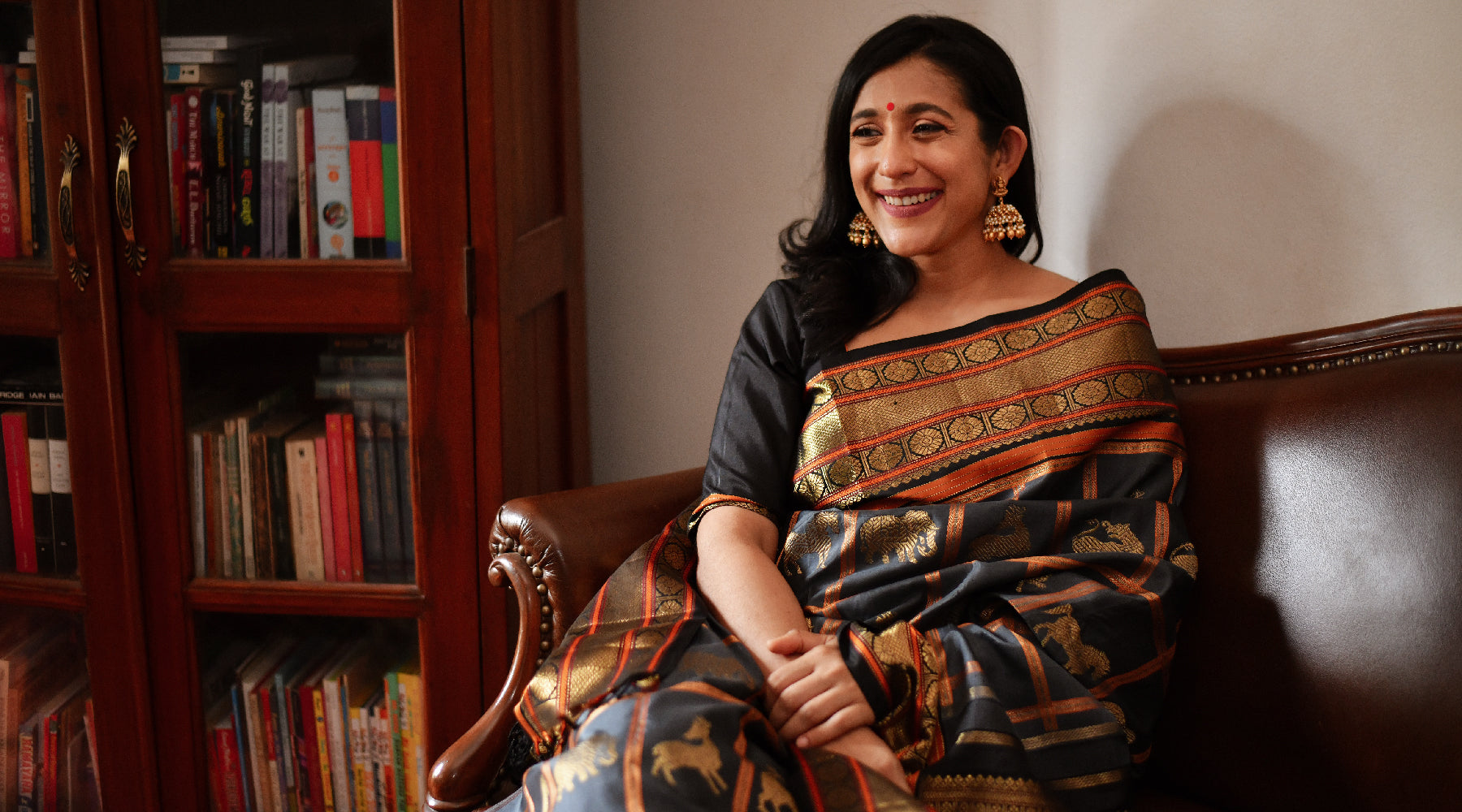KANAKAVALLI VIGNETTES : Kanika Subbiah - Evolving Traditions

For Kanika Subbiah, who grew up in Chandigarh, Chennai’s sari culture was a revelation. In Kanakavalli’s June Vignette, Kanika describes her discovery of the kanjivaram, the evolution of her sense of fashion, and how Chennai has come to feel like home. In conversation with Aneesha Bangera of the Kanakavalli Journal, she discusses the challenges of being an entrepreneur and balancing the many demands on her time, while reminiscing about her childhood growing up on a university campus in Chandigarh. Through her start up Wedding Wishlist–a platform built around a gift registry–Kanika is changing the way we approach weddings, using technology to make them simpler, smarter and less wasteful. Kanika defines beauty as being authentic and comfortable in your own skin, while tradition, she says, helps you to be true to yourself. Taking time out of a non-stop work schedule, Kanika contemplates the Kanakavalli repertoire and curates a selection of kanjivarams that reflects her love for colour and weave.
Evolving Traditions
What was your childhood in Chandigarh like? What are some of your favourite memories of growing up there?
My father was a professor of Applied Mathematics, and we grew up on the engineering college campus in Chandigarh. I had a very typical campus childhood – peaceful, involving a lot of time spent outdoors. One of my most profound memories is of gardening with my father. We used to grow a lot of fruit and vegetables, and my biggest thrill was when the new tomatoes and mangoes and lychees started coming in. I took such delight in watching new life grow and in being a part of that. At home now, my children and I have just made a little garden of our own. And as a family we still love to spend a lot of time outdoors, even in the summer!

Having grown up in the north of India, and then spent many years living in the US, does Chennai feel like home? Tell us a little bit about your relationship with this city.
Chennai absolutely feels like home to me. It’s a wonderful place and my favourite city to live in, in India. This time of the year – May and June – is probably the hottest, and I’m sitting here sweating, but I still don’t really mind the weather. I enjoy the people, who I find very progressive; I really enjoy the conversations I have with the women of this city. From a work perspective, I am able to find all the talent I need for my startup right here in the city. From a lifestyle perspective as well, I think the city offers a really good balance of everything a big city has to offer, without the crazy traffic and hectic lifestyle. We have a good culture, music and arts scene, and I’m told there’s also a vibrant comedy culture which I’m yet to explore. Of course, we also have the best cricket team! I’m a part of running and cycling groups in Chennai, and I find more and more people coming out and embracing fitness which is heartening. It’s amazing to see how the entire city seems to go out on a Sunday morning. At Besant Nagar beach you see people playing Ultimate Frisbee, dancing, jogging, walking, eating… it’s great! Moving back to India from the US required a little bit of an adjustment, especially since we moved with two small children. But the fact that we moved to Chennai made it really quite easy, and there hasn’t been a day when we have regretted coming back. I think even for our children, who spent the first few years of their lives in California, Chennai is really home now.
Have you always been an outdoorsy person? What role does fitness play in your life?
I grew up with a very fit father. He was a runner and I would run with him many mornings. He taught me how to swim when I was five years old, and this has been something I’ve continued to do all my life. Yoga, running, cycling and swimming have always been and continue to be a part of my life. Chennai is a great city to do all of these things. For me, a good weekend is one on which I’ve worked out on both Saturday and Sunday. The day just doesn’t feel right if I haven’t done some form of exercise in the morning. But I’m not a fitness fanatic, I’m pretty easy going and like to keep everything in balance. I work out four or five times a week. My husband and I do yoga and meditation together, and this has become part of our daily routine. It’s made a huge difference to our ability to focus, and clarity of mind. A lot of our holidays also happen to be active holidays; last year we did a cycling trip with the kids, and we all love to ski.
Wedding Wishlist is truly your passion project. How did you come to set up a wedding registry, and what has the journey been like?
Wedding Wishlist is something I started three years ago. My husband Vellayan and I lived in the US for 16 years, after which we moved to Chennai about 10 years ago. I noticed that there was a need for a wedding gift registry in India, to address the large gap between wedding gifts a couple desires, and gifts they actually receive. Most couples, particularly millennials, know exactly what they want, depending on whether they plan to stay with family, start their own home, or want to donate to charity or travel together. So, on the one hand we have a couple who knows exactly what they’d like. On the other hand, we have a guest who has no idea what the couple wants, but would like to gift them something useful. Wedding Wishlist is a technology platform that makes it easy for the couple to receive any gift they want, and for the guest to gift something meaningful and be a part of their happiness. India is host to nearly 11 million weddings each year. Gifts given to the couple add up to about Rs. 2 lakh; even assuming that half of those gifts are in cash, most of the remaining gifts end up getting re-gifted or wasted, and amount to a wastage of 1 lakh crore rupees! By creating a gift registry on WeddingWishlist,com, prospective couples are saved from unwanted gifts, and having to go shopping immediately after their wedding for what they actually need. Instead, they can receive exactly what they want, delivered when and where they want. The Wedding Wishlist platform is built around the gift registry, which integrates with their personalised wedding website, available as an app and facilitating the sharing of wedding details with guests. They can also design digital invitations and go paperless, another emerging trend. The whole idea of Wedding Wishlist is to help couples have smarter weddings. Our vision is that a gift registry becomes an essential part of the wedding planning process, and the wedding itself is an event free of the physical exchange of gifts!

Above: Kanika with her Wedding Wishlist co-founders Tanvi Saraf and Sathish Subramaniam
Could you share some of the more interesting requests that you have received for weddings?
In India, many people consider silver a good wedding gift. They feel that even if the couple never uses the actual object, at least it has some value. Interestingly, in the registries we’ve worked on, couples almost never opt for silver. The more common gifts they list are kitchen appliances, furniture, home accents and décor objects like lamps or rugs or vintage collectibles. Some of the quirkier gifts we’ve seen on a registry are a wine cooler and a karaoke machine. Couples are also increasingly choosing experiences. Last year, one couple we worked with asked their guests to contribute towards any of three experiences – a rafting trip in Rishikesh, a cycling tour of Tuscany, and a visit to the Galapagos islands. In this way, the wedding gift becomes so much more meaningful. Things like a trip to a remote island, which would be far too expensive for a single guest to give, become group gifts with everyone contributing what they’d like to. At Wedding Wishlist, we also help couples with thank-you cards, video invites, building wedding apps and apps to manage guest lists. Using technology, we want to change the way we approach weddings in India, making them smart, paperless, simpler and waste-free.
You also run the gifting site CherryTin. How do you manage your time and find a work-life balance?
CherryTin is another platform of the Wedding Wishlist company, that works in the corporate gifting space. This year will be our sixth Diwali, and we have a loyal set of corporate customers. The uniqueness of CherryTin lies in our personalised gifting repertoire, ranging from stationery and hampers to beautiful leather products. When it comes to managing my time, I have to admit I work very long hours. We are a startup with a small team of 20 people. Half the team works in tech, while the rest is in design, marketing and client servicing. I work hard, starting at 9am and usually until late evenings, and even on most weekends. I practice Yoga, which helps me put a little distance between myself and my work.
What have been some of the greatest challenges and joys of being an entrepreneur in India over the last few years?
In India as a culture, we are very relationship-driven. And I think this is both good and bad. Systems and processes are often not enough to get the job done, instead you really have to invest in relationships at every step of the way to create brand recall. I find this very gratifying on the one hand, but on the other it is incredibly time consuming. We find that even though we’re a digital firm, we spend a lot of time on marketing and customer service efforts offline – answering queries, focusing on client needs. This requires a great deal of time and attention, but is inevitably worth it. It is a rare day that I don’t learn something new, and this is my greatest joy!
Before you got married, you rarely wore saris, and wore your first kanjivaram on your wedding day! Could you tell us how your definition of fashion has changed over time?
My sense of fashion has evolved a lot over the years. Moving to Chennai has played a role in this evolution. Chennai is a very special place because it has its own, very distinct aesthetic. After moving here, I noticed the many moods of the sari, and how it is worn as an everyday garment, with comfort and grace. For me this was a revelation – growing up in Chandigarh I’d almost never seen the sari, except perhaps at weddings. Even now, while most of India has moved to lehengas and gowns, Chennai is still steeped in the sari. This is wonderful because it is truly a beautiful garment. I love colour, and on returning to India I have enjoyed diving into the various hues on offer, not just in the sari but across textiles. I find myself wearing a lot of cotton and linen garments, largely because of the weather. I would say that my personal sense of fashion is defined by natural fabrics, which I go out of my way to seek; this has been the biggest shift for me.
What do beauty and tradition mean to you?
Tradition is important to me. Often, these are things one grows up with, that provide a certain grounding and meaning to what we do. For me, certain elements from the North and South define traditions that are part of my life, for example, wearing natural fabrics and eating sustainably and locally. For me, beauty is being authentic and comfortable in your own skin. And the role of tradition is just that, to ultimately help you be true to yourself.

What is your relationship with the sari, and with the kanjivaram in particular?
The sari has been a discovery for me, especially the kanjivaram. I did not know the complexity of weaving involved, and am amazed at the incredible skill that goes into every sari. My move to Chennai really opened up the world of the sari to me. I love to see the interplay of colour in the kanjivaram and its contrasting borders. Although I myself prefer simpler saris woven in a single hue, I notice the way borders are attached to the sari, and love when this attachment appears to be almost seamless. I understand how intricate the weaving is, and this makes it all the more special. I don’t wear saris every day, but when I do I’m very particular about them. I have not stepped inside another sari store since I was introduced to Kanakavalli a few years ago. At Kanakavalli, it’s always an experience beyond buying a sari, and I look forward to my visits to the store, as well as conversations with Ahalya that make these visits even more memorable.

Tell us about the kanjivaram you chose to wear for the Vignettes shoot.
This sari, I think, is very unusual and special. It’s quite a contemporary colour for a kanjivaram. I might not have spotted it on my own, but Ahalya helped me choose it, and to appreciate many of its finer details. It’s perfect for me, in a single colour with another hue woven into it. It’s unlike any other kanjivaram I’ve ever seen and I’ve truly enjoyed wearing it.
(Kanika wears an elegant sky blue Kanakavalli kanjivaram with dotted checks in gold zari and red on the body. The pallu, woven in 'adai', features horse and deer motifs amid paisley, floral and geometric patterns)
- Kanika Subbiah, in conversation with Aneesha Bangera, photography by Raghuram Vedant
View Kanika's curation here



